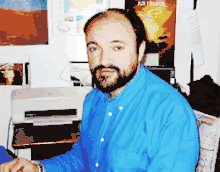Carlo Urbani
Carlo Urbani (Italian: [ˈkarlo urˈbaːni] ⓘ; 19 October 1956 – 29 March 2003) was an Italian physician and microbiologist and the first to identify severe acute respiratory syndrome (SARS) as probably a new and dangerously contagious viral disease,[1][2] and his early warning to the World Health Organization (WHO) triggered a swift and global response credited with saving numerous lives. Shortly afterwards, he himself became infected and died.
Carlo Urbani | |
|---|---|
 | |
| Born | 19 October 1956 Castelplanio, Italy |
| Died | 29 March 2003 (aged 46) Bangkok, Thailand |
| Cause of death | SARS |
| Education | University of Ancona |
| Known for | Identifying SARS |
| Spouse | Giuliana Chiorrini |
| Children | 3 |
| Medical career | |
| Profession | Physician |
| Institutions | Médecins Sans Frontières World Health Organization |
| Research | Infectious diseases, parasitic diseases |
Medical career
Urbani graduated with a medical degree in 1981 from the University of Ancona and specialized in infectious and tropical diseases from the University of Messina. He subsequently earned a postgraduate degree in tropical parasitology.
Urbani started volunteering for the African endemic disease cause since young joining the Italian Catholic NGO Mani Tese. In 1987 Urbani went to Ethiopia for one month. In 1989 he was primary aide in the infectious diseases department of Macerata, Italy. After years working in the epidemic medicine field, in 1993 he became an external consultant of the World Health Organization.
In 1996, he joined Médecins Sans Frontières (MSF) and moved with his family to Phnom Penh, Cambodia for a year. Upon his return to his workplace in Macerata, he became president of the Italian section of MSF. He also helped launch a campaign against multinational pharmaceutical companies that keep up the price of indispensable medicines against AIDS, malaria and tuberculosis. In 1999 he was part of the delegation that received the Nobel Peace Prize awarded to MSF.[3] With the prize money, Urbani decided to create a fund to promote an international campaign for access to essential medicines for the world's poorest populations.
SARS outbreak
Back in Asia,[3] Urbani was called into The French Hospital of Hanoi, Vietnam, in late February 2003 to look at an American patient, businessman Johnny Chen, who had fallen ill with what doctors thought was a bad case of influenza. Urbani realized that Chen's ailment was probably a new and highly contagious disease. He immediately notified the WHO, triggering a response to the epidemic (principally isolation and quarantine measures) that would end it within five months.[4] He also persuaded the Vietnamese Health Ministry to begin isolating patients and screening travelers, thus slowing the early pace of the epidemic.
On 11 March 2003, as he flew from Hanoi to a conference in Bangkok, Thailand, where he was to talk on the subject of childhood parasites, Urbani started feeling feverish on the plane. A colleague who met him at the airport called an ambulance. Urbani had contracted SARS while treating infected patients in Hanoi. His Bangkok hospital room became an improvised isolation ward, and communication occurred via an intercom. As his lungs weakened, he was put on a ventilator. During a moment of consciousness, Urbani asked for a priest to give him last rites and asked for his lung tissue to be donated for scientific research. Urbani died on 29 March 2003, after 18 days of intensive care.[2]
SARS-CoV Urbani strain later became the reference variant of this outbreak.
Personal life
Urbani married Giuliana Chiorrini in 1983, and in 1987 their first child, Tommaso, was born.[5] He had two more children.[3]
Honours
National honours
- 3rd Class / Knight: Cavaliere dell'Ordine della Stella d'Italia: 28 May 2020

- Medaglia d'oro per i benemeriti della Sanità Pubblica: 7 April 2003

Foreign honours
 Friendship Order: 7 April 2003
Friendship Order: 7 April 2003
See also
- Li Wenliang, was reprimanded for warning colleagues about the COVID-19 pandemic and later died from the virus.
- Liu Jianlun, Chinese doctor who died from the virus SARS-CoV-1, is believed to have been a super-spreader during an event in Hong Kong.
References
- Pierluigi Fiorini (2004). Carlo Urbani : inseguendo un sogno. Evergreen (in Italian). Cinisello Balsamo: Edizioni San Paolo. p. 97. ISBN 9788821551338. OCLC 954723560 – via sites.google.com, archive.is.
{{cite book}}: External link in|via=
- Coates, Sam; Asthana, Anushka. "Dr Carlo Urbani Health expert who identified the Sars outbreak as an epidemic, and was killed by the virus". The Times. London.(subscription required)
- "Dr. Carlo Urbani of the World Health Organization dies of SARS". WHO. 29 March 2003. Archived from the original on 5 June 2003. Retrieved 23 January 2020.
- McNeil (Jr.), Donald G. (8 April 2003). "Disease's Pioneer Is Mourned as a Victim". The New York Times. ISSN 0362-4331. Retrieved 6 December 2019.
- "Summary of probable SARS cases with onset of illness from 1 November 2002 to 31 July 2003". World Health Organization (WHO). 31 December 2003. Retrieved 31 October 2008.
- "8 - Carlo Urbani - Una vita per gli altri". Logifranchi. Nel mondo - CRONACA - 8. 31 August 2004. Retrieved 23 January 2020.
- On behalf of the Italian association named "Testimoni del tempo". Bibliographic note in Paul Ricoeur (1997). La critica e la convinzione. Intervista con François Azouvi e Marc de Launay. Di fronte e attraverso - Filosofia (in French and Italian). Translated by Daniella Iannotta. Jaca Book. p. 54 (of 262). ISBN 9788816404373. OCLC 841199842. Archived from the original on 29 August 2019 – via archive.is.
{{cite book}}: External link in|via=